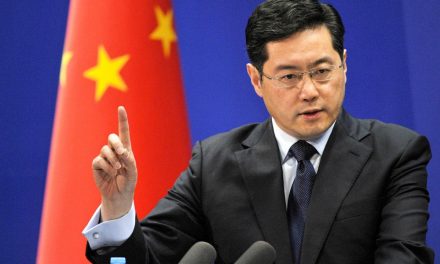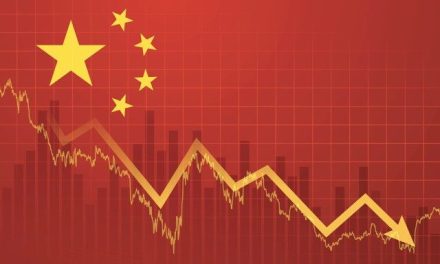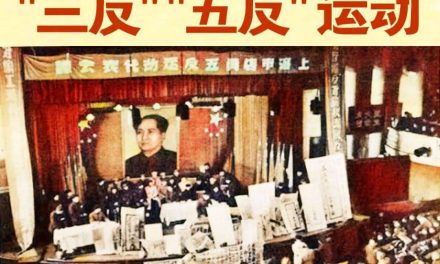Editor’s Note: Jiang Ping(江平), former president of the China University of Political Science and Law, resigned because of his pro-student position in the events leading up and subsequent to the June 4, 1989 massacre. He was highly respected in academic circles and was one of the main creators of Chinese civil and commercial law. He passed away in late 2023.
Wu Jinglian(吴敬琏) is a preeminent economist in the People’s Republic of China, primarily specializing in Chinese economic-reform policy.
In the last part of 2023 and into 2024 I wrote a short article and submitted it to Yibao [Chinese]. The title was “I Watch the Final Call of Jiang Ping”s and Wu Jinglian’s‘Last Scream.’” [Jiang was legal scholar who recently passed, a university president and member of China’s nominal legislative branch. Qu is longtime scholar and participant in Chinese economic reform. It not only mourned the scholar and teacher Jiang Ping, but also paid tribute to the two men’s appeal for a law-based economy. On January 9, this theme actually became the title of an editorial in Shanghai’s Yicai, entitled “An Economy Based on Law is the Best Market Economy.” But how does one define “best”? Of course such an idea is worthy of praise, but in my opinion, a market economy has its own rules of development, and so can be understood as being at different stages and levels. The most important thing is whether it is a true market economy or a false one, i.e. whether it qualifies as a genuine market economy. Isn’t the focus of our debate with Western countries at its essence the question of a genuine market economy versus a counterfeit one?
Beginning to wake up, and looking forward to more of the same
The editorial surprised me, since it means that a state-run media company has dared to raise this “law-based economy” at such a high level and put the issue so bluntly. Was it inspired by Jiang and Wu? Or was it a special directive from the senior management? I can’t guess where the truth lies. But it is undeniable that without the restraints provided by law, there can be no real market economy. If most people were unaware of this idea and ignored it during the first round of reform in the 1980s, now it has obviously become a social consensus.
Looking back at the re-marketization (or partial re-marketization) movement in the 1980s, there was a debate over the notions of capital and the collective. Reformers (not necessarily a formal faction, but people certainly of common views broadly speaking) believed that in order to develop a market economy, private property rights and the rule of law could not be avoided. Reforms must be complementary. Political, economic, judicial, and cultural education all needed to be comprehensively reformed. Otherwise, what resulted would be a confused half-reform, and the results would not be healthy. If the market cannot thoroughly instantiate itself, it easily leads to power-based rent-seeking, and comprehensive corruption. The political leaders Hu Yaobang, Zhao Ziyang and many liberal economists all supported such comprehensive reform.
However, Chen Yun, Bo Yibo, Hu Qiaomu, Deng Liqun and other die-hards advocated what we might call a “birdcage economy,” in which the ropes that bind the people a are loosened just a bit, and the small birdcages are then replaced with medium-sized and ultimately large ones. For example, it is clear that agricultural production teams should not be disbanded outright, but it was not permitted to say “divide the fields and let people work for themselves.” Rather, it had to be called “autonomous production for the collective.” It would have been unthinkable to speak of such concepts as “smashing the birdcage and releasing the people’s vitality,” the free movement and exchange of resources, integration with the world’s “capitalist market,” and so on, Because that would have been “restoring capitalism,” an absolutely unforgivable “sin.”
The wily Deng Xiaoping worked with the die-hards and used tactics such as “no contention,” “black cat, white cat,” and “crossing the river by feeling for stones” to achieve compromises. After the passage of time, they saw that in a free market, independent management was more effective than the “socialist iron rice bowl,” and so they created the idea of “market tools,” saying that “the market has existed since ancient times, so capitalism and socialism can both be used,” thus creating the freakish hybrid called the “socialist market” with “Chinese characteristics.”
These so-called Chinese characteristics are “the leadership of the Communist Party, public ownership as the mainstay, and the state-owned and collective economy as the dominant economy.” The private economy is only a “supplement to and adjustment of” socialist public ownership, or a “temporary tool.” As socialism develops and grows, it will still be the goal and direction of the Communist Party to completely eliminate capitalist private ownership in the future. To this day, there are still Marxist-Leninist fundamentalists who preach the bizarre theory that “either humans will destroy the market, or the market will destroy humans.” As a result, the “instrumental,” “expediency,” “transition, “adjustment,” and other so-called theories of the market economy have emerged one after another. The CCP’s fundamental nature, its core hatred of and hostility toward the market economy, is hard to change. Due to ideological complications, it is impossible for it to regard the private market economy as the country’s development direction.
According to Chen Yizhen, Zhao Ziyang’s intellectual guide, it was not impossible to carry out thorough market-oriented reforms (or even to support such reforms). For example, Du Runsheng, the veteran of rural reform, and his supporters Wan Li, Zhao Ziyang and others all agreed to support more extensive reforms. If we could have unified our thoughts at that time, spoken with one voice, clearly explained the importance of supporting thorough reforms and the harm of mere half-hearted reform, and overwhelmed the conservatives in the area of public opinion, it would have be possible to persuade Deng Xiaoping to finish the job, to dissolve the communes, distribute farmland to households, legitimize privately owned land and banks, and thoroughly reform state-owned enterprises. And the party and government could have been separated. With the support of Peng Zhen, legislation could have been introduced to establish the inviolability of private property rights and the equal status of business owners. The reason was that at that time, the resistance to supporting reforms mainly came from ideological considerations rather than vested interests. And because the whole society was so poor, income was generally equally distributed, and the social atmosphere was relatively clean. Even if there were cases of corruption, it was not substantially established, let alone institutionalized.
Alas, it was not to be, One of the worst decisions at that time was Deng’s “no contentions.” He was worried that the reformists would gain power and not only deny Mao, but also Deng himself, thus shaking the CCP to its foundations. Therefore, the communes could not be dissolved and the Planning Commission could not be abolished. They were only renamed “townships” and the “National Development and Reform Commission.” The iron rice bowl for civil servants and others inside the system strengthened instead of weakening. Many of these people were not keen on the market. Instead, they took advantage of reform and of the “dual-track system” and used their power to seek rents, which became a stumbling block to fair market competition.
After the June 4th massacre, Jiang Zemin tried to engineer a comprehensive retreat and “bankrupt the capitalists,” but was stopped by Deng. Through the latter’s southern tour, Jiang was forced to make his fortune in silence and broaden the range of people who could extract wealth and seek rents, and thus further distorted the market, intensified the polarization between rich and poor, and worsened social conflicts. Once this aristocratic system is relatively solidified and the symbiosis between power and money cannot be reversed, any attempt to reform the system (such as property disclosure) will mean accountability, so beneficiaries of the system must resist with all their might. Therefore, the resistance to and difficulty of bringing about a law-based order today are worse than we could possibly have imagined in the 1980s.
Although after much suffering the difficulty has increased, as have internal and external pressures, and the economic crisis has deepened, which has forced everyone to reflect, generating significant progress in understanding. Finally, someone has spoken up and publicly stated that “the law-based market economy is the best market economy.” This made has made my eyes light up, and feel a glimmer of light amidst the darkness and stagnation. However, the shortcoming of the editorial is that it is limited to the legal and economic level, and does not dare to touch on the deeper issues of law-based government or law-based society. Of course, this is not necessarily because the author’s awareness is limited, but because these are still things that cannot be said. Therefore, I have had to rely on my old skills to make up for the shortcomings of the editorial via this article.
A law-based society needs completeness, coherence
Upon careful reflection, the three suggestions in the editorial are not feasible currently. For example, Article 1, “Clean up the fragmentation of private economic-development policies.” What is “fragmentation”? How can it be defined? And who will do the cleaning up, and how? And then what happens? In a situation where the party represents the government and is above the law, the party and government agencies issue policies at will. One sentence of nonsense can become new policy. It has become a bad habit amongst officialdom to change one’s approach whenever one’s superior changes. This is true for the central government as well as for local governments. If we don’t change these bad habits, is it useful, or even feasible, to try to clean up the current mess?
Consider too Article 2: “Make it clear that protection is the best principle. It is necessary to protect both the property and personal rights of private enterprises.” This sentence is also remarkable. Many entrepreneurs, including Sun Dawu, have said, “We do not need protection, let alone special care. We only need to you to govern in accordance with the law and treat people fairly.” Jiang Ping, who had defended the first Sun Dawu case [Sun being a wealthy man targeted by the CCP in 2020], angrily criticized the second government attack on the group, saying “The Company Law clearly stipulates that corporate legal persons must be treated differently from natural persons, and legal persons cannot be arbitrarily prosecuted and punished for company business errors. This time it happened in broad daylight, and the man’s whole family and senior company executives were arrested and sentenced severely. Convict first, only then collect evidence, and then paint the outcomes as a matter of high principle. How can there be any trace of the rule of law here?”
Turn now to Article 3. In terms of the construction of the rule of law, it is necessary to further reflect the expectations of market entities for neutral competition. Here the article beats around the bush and is too cautious. What is “reflection” and “expectation”? To put it bluntly, isn’t it just a suggestion to the government not to favor state-owned enterprises or related parties in competition, but to adhere to the position or principle of “neutrality”? But this is all in vain, because there is no judicial independence, and the party is still in charge of the judiciary. It is the political and legal committee (or even the secretary) who has the final say. Can he or she not favor his or her own people, in the form of state-owned enterprises, or the relationship between his or her power and money, the ability to transform dirty money into clean, or vice versa?
Speaking of this, I easily think of another sentiment of Professor Jiang: “China’s problem is that ‘there are laws and regulations but no governance.’ It is a constitution that cannot be implemented.” This hits the key point. When it comes to legal provisions, China has no shortage of them. It even has an institutional framework similar to the separation of powers, but it is merely decorative and not actually implemented. Mao said publicly that laws (including the Constitution) are for foreigners to see and cannot be used to bind the Communist Party’s own hands and feet. Therefore, he and Jiang Qing both flaunted their lawlessness. After returning from the Cultural Revolution, Peng Zhen once led the National People’s Congress efforts on legislation. He suffered from the horrific memory of “lawlessness.” He was very enthusiastic about improving the legal system and encouraged civil discussions about whether “the Party is bigger than the law.” But of course, the weaker cannot limit the stronger, and judicial independence (neutrality) is still vainly sought.
Of course, to trace the origins of the law-based market economy theoretically, we must also refer to Western political-science theory. Our ancestors, the two schools of Confucianism and Legalism, or the three schools of Confucianism, Buddhism and Taoism, could not get out of the vicious cycle of the rise and fall of dynasties and the accompanying chaos. If the Western wind had not spread these ideas eastward and promoted the reform and revolution of 1911, we might still have braids and bound feet. But bad habits cannot be eradicated. Unfortunately, the October Revolution also sent Marxism-Leninism and eventually evolved into what Mao said was “Marx plus [emperor] Qin Shihuang,” Chinese-style communist dictatorship, which is even now in conflict with mainstream civilization. Today, if we want to clean up the historical wreckage and restore universal values, we must start by reviewing Western thought. Focusing on the law-based economy, I first introduce four classic theories.
1. Why do humans establish countries? On the basic functions of the state machinery, as characterized by the British thinker Thomas Hobbes, the general idea is that the emergence of the state is to end the law of the jungle, establish basic order, and protect the safety of citizens’ lives and property. Without a country, there would be no order; without order, there would be no law, and without property rights, there would be no fairness, justice, market division of labor, and the development of science, and humanity more generally. The state serves society, society does not serve the state.
2. Government power must be limited. The representative figure here is Britain’s Edward Acton. He pointed out that human beings need the state, but the greater the power of the state, the greater the harm, because power leads to corruption, and absolute power leads to absolute corruption. Therefore, no one should glorify, worship, and expand power. But please note that what is referred to here is “power,” not “rights.” These are two strictly distinct words — “power” is the ability to control others, while a “right” is a tool to protect oneself according to law. But we Chinese have a habit of using them interchangeably. For us, there are both translation problems and conceptual ambiguity.
3. How to limit power, with the representative figure being Britain’s John Locke. Locke first proposed the concept of limited government, that is, the idea that the power of the government must be authorized by legislation and subject to legal constraints. These include universal suffrage, separation of powers, checks and balances, supervision by public opinion, etc. State actions should be prohibited without authorization by law. Citizens’ rights, on the other hand, are broader and actions should be permissible unless prohibited by law.
4. How can the drawbacks of democracy (tyranny of the majority) be prevented? Here the representative figure is France’s Alexis de Tocqueville. Democracy can effectively restrict public power through fair elections, free association, and supervision through public opinion. But democracy is only a means, and freedom is the goal. The greatest danger of democracy is when some “majority” becomes the absolute authority, and democracy in fact can easily be manipulated by oligarchs, leading to the “tyranny of the majority.” One of the ways to avoid this is to check and balance power, apply a bill of rights in parliament to prevent the emergence of such tyranny, and avoid passing extreme bills that suppress ethnic or other minority factions. Of course, the Christian spirit of tolerance and fraternity of “I will live, and you will live as well” also has a great balancing effect.
The “five poisons” are all in fact necessary, and none is dispensable
To return to the topic: what basic elements should a law-based economy include? In referring to how those in power in China see them, I like to use the term “five poisons,” which can be summarized as private property rights, democratically elected government, judicial independence, freedom of speech, and fair competition. The following is a brief explanation:
1. Private property rights are inviolable, and the factors of production must circulate freely. Property rights should include all mobile properties (machines, equipment, raw materials, etc.), real estate (land, factories, mines, etc.), funds and intellectual property rights, as well as labor freely sold by workers. As for Marx’s “surplus value” or “exploitation,” we need not go into details here. Why is private ownership the basis of the market economy? Because market transactions are equivalent exchanges between owners, creating value on both sides.
As for why people have selfish desires, must they? Must we compete? That has to be discussed from the dual nature of human beings, characterized by both competition and interdependence, which I also don’t want to get into too much here. In short, economic laws and historical experience have proven that the market, and only the market, can achieve the optimal allocation of factors and promote the fastest improvement in productivity and human welfare. The core of the market economy is private property rights, capital accumulation, market competition, and free exchange, including barter as well as the exchange of labor for wages and benefits.
Are there irreconcilable contradictions between private property rights and mutual aid and cooperation, personal interests and collective well-being, the pursuit of profits and selfless dedication? Or is it a mutually dependent relationship? I believe that judging from the universal success of the market economy and the failure of the planned economy, the above relationship seems contradictory, but in fact it is a dialectical unity. Only by clarifying private property rights can we ensure voluntary mutual assistance and cooperation between owners on the basis of fairness and reciprocity. Contra Marx, exchange of equal value among different kinds of capital is not the source of exploitation, it is rather plunder supported by privileges. The practice of various countries has proven that as long as property rights are protected, any other form of mutual assistance and cooperation can be tried out. If all parties are satisfied, continue; if not, cease. Because competition promotes the development of productivity and social wealth correspondingly grows rapidly, labor and management can ensure the sharing of wealth through bargaining, and a rising tide lifts all boats.
2. A democratically elected government that changes regularly and decentralizes powers, so local autonomy can check and balance. The issues of state tasks and restrictions on government power were mentioned above. The most reliable solution is universal suffrage and local self-government. The president of the United States does not have the power to remove governors and county commissioners, because states and counties have decentralized powers and enact their own local regulations and elect their own officials. In the past dynasties of China, the imperial power only reached the county level. (County-level officials were appointed by the imperial court). Township (town) and village (district) officials on the other hand were selected by the people and they managed their areas autonomously. Taiwan still uses the old system, which is conducive to harmony and stability at the grassroots level of society and is worthy of consideration by China. The function of the state is mainly to maintain social order and balance conflicting interests. On the one hand, it protects the legitimate rights and interests of all classes and places through the legal system. On the other hand, it regulates conflicts among different interest groups through taxation and transfer payments. Of course, if the government wants to be honest and efficient, that the source of power must be election by universal suffrage in accordance with the law, popular sovereignty, openness and transparency, term limits, party competition, and media supervision is self-evident.
3. Judicial independence must not be traduced, and trials, in accordance with the law, must be open and transparent. Judicial independence is also part of the decentralized checks and balances of state power. In most Western countries, the legislative, judicial, and executive powers are separated. The government of the Republic of China created two more branches (the Supervisory Yuan and the Examination Yuan), dividing powers among five branches. In fact, the functions of supervision and civil-servant selection can be appropriately allocated among the legislative, judicial, and human-resources departments, while other functions are left to the media (known as the fourth estate). Regardless of whether there are three or five branches, the judicial function cannot be dominated by the executive, let alone managed (or controlled) by the ruling party. If it is it will become both a referee and a player, with conflicts of interest and confusion of roles, generating ineffective results, and thus becoming an international joke. If you carefully read the news and related materials of the Sun Dawu case in the Gaobeidian District Court of Hebei Province, including the subsequent plundering of Dawu Group’s assets (the eating scene was particularly ugly), you will know how ugly the farce of the party’s management of justice is. If the judiciary is not independent, there is no fairness and justice, making the market order almost impossible to regulate. How then can we even begin discussing a law-based economy?
4. Freedom of speech, open media, and no interference in academic research. The importance of freedom of speech is not only to ensure that citizens have the “right to know,” but also to exert social supervision over and restraint of the government to prevent corruption of individual officials, public figures and government agencies. When it comes to protections in the law-based economy, there are many examples that can be cited. For example, power-for-money transactions, shady market practices, malicious monopoly, forced buying and selling, counterfeiting, poisonous food, etc. The popularity of these ugly behaviors that undermine the market economy is of course related to transactions between power and money, but also to coverup and protection by the official media. If there is freedom of speech and the media can expose such conduct at any time, it is undoubtedly an important guarantee of market order. Sadly, all major scandals have been severely blocked by the government under the pretext of “maintaining stability.” From melamine, tainted milk powder, and Sudan red dye [a carcinogen whose discovery in multiple food items prompted their recall], Hongmai medicinal liquor, to the tragedy of Dr. Li Wenliang, there are so many occurrences, and lessons to be learned, that they are almost too numerous to mention.
5. Fair competition rejects any coercion, and monopolistic behavior must be investigated. This article must talk about the monopoly trend in market competition. If there are no legal constraints or supervision through public opinion, businesses’ monopoly desires and development trends may grow and become difficult to control, eventually becoming sinister forces that undermine fair competition. The pursuit of excess profits (e.g., only one store, no other branches) is an always extant trend in product competition, found in both state-owned and private companies. (Lenin analyzed this in detail in his book “Imperialism, the Highest Stage of Capitalism.”) To prevent monopoly, there have been relevant laws since ancient Rome. These “antitrust” and “fairness“ laws require that the market share of a company or consortium in the industry must not exceed some maximum legal proportion. If a company does so, it must be forcibly split into smaller companies in order to protect the competitive vitality of the market.
Nowadays, antitrust laws gradually cover pricing, bidding, mergers and acquisitions, dumping, market access and other aspects. In particular, ultra-low price dumping with state support has become an important reason for European and American countries to boycott Chinese exports. China often uses “export tax rebates” and other measures to give huge subsidies to exported goods and services to support them and lower prices below cost, making foreign competitors unprofitable and even bankrupt, thereby forming its own monopoly, thus seizing pricing rights and earning excess profits. This is actually the behavior of state monopoly capitalism that Lenin criticized. It is said that China has successfully seized monopoly advantages in fields such as photovoltaics, rubber, electronics, and electric vehicles.
In sum, as I see it the “five poisons” that a legal economy must possess are indispensable. If this can be done, a country will have a genuine law-based economy, or to put in another way qualify as a market economy. If it cannot be done, or if it is not actually desired to do it (as Zhu Rongji said in discussing how to react to pressure on China to take steps before it would be permitted to join the WTO, “join first and then talk about it”), China will not be able to integrate into the world market. At the time, Premier Zhu solemnly signed the WTO accession agreement on behalf of China, promising to gradually change policies according to the required standards, and finally to meet the WTO requirements, allowing the Chinese economy to fully integrate with the international market and become a member of the international family. But while the benefits of joining the WTO were tasted, the promised reforms were not implemented. Therefore, fundamentally speaking, the friction and collision between Chinese and Western systems is inevitable.
These days, the slogan “law-based economy” is constantly shouted out, but the overall framework of a country based on law is still missing. Therefore, I stand up, call out the emperor’s missing new clothes, and write this unpleasant point: without a country based on law, how can there be a law-based economy!
Initial draft on January 10, 2024
Final draft on January 20, 2024
Written in an apartment in Beijing
The author, Guan Fengxiang, is a retired professor in Beijing
This piece was translated from Yibao Chinese. If republished, please be sure to add the source and link before the text when reposting.
The views of the author do not necessarily represent those of this journal.
























